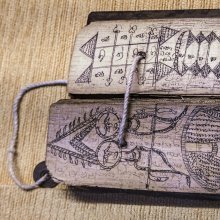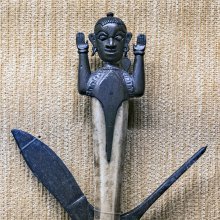Ola, Ōla: 11 definitions
Introduction:
Ola means something in Hinduism, Sanskrit, Marathi, Hindi, biology. If you want to know the exact meaning, history, etymology or English translation of this term then check out the descriptions on this page. Add your comment or reference to a book if you want to contribute to this summary article.
Images (photo gallery)
Biology (plants and animals)
Source: Google Books: CRC World Dictionary (Regional names)Ola in India is the name of a plant defined with Amorphophallus paeoniifolius in various botanical sources. This page contains potential references in Ayurveda, modern medicine, and other folk traditions or local practices It has the synonym Candarum hookeri Schott, nom. illeg. (among others).
Example references for further research on medicinal uses or toxicity (see latin names for full list):
· Research Bulletin (1970)
· Taxon (1983)
· Kew Bulletin (1985)
· Synopsis Aroidearum (1856)
· Species Plantarum (1753)
· Fitoterapia (2005)
If you are looking for specific details regarding Ola, for example diet and recipes, side effects, health benefits, extract dosage, pregnancy safety, chemical composition, have a look at these references.

This sections includes definitions from the five kingdoms of living things: Animals, Plants, Fungi, Protists and Monera. It will include both the official binomial nomenclature (scientific names usually in Latin) as well as regional spellings and variants.
Languages of India and abroad
Marathi-English dictionary
Source: DDSA: The Molesworth Marathi and English Dictionaryōla (ओल).—f n (S) Humidity, moisture, dampness, wetness. 2 fig. Feasibility, ground to work on. Ex. tēthēṃ kāṃhī ōla āhē There is something to be got there, some succulence or sappiness, some facilities or favorable indications, some points to warrant expectation or hope. ōla āhē kīṃ pōla or phōla āhē, ōla nā pōla, ōla kīṃ pōla (Any moisture? or all dry husks?) i.e. Is there anything to be got (at, in, on, by)? 2 A phrase of inquiry amongst children in presenting a closed hand. ōla dharaṇēṃ To plough the ground before its moisture (from the rains) has evaporated. ōlīlā ōla miḷaṇēṃ Used of the regular rain meeting with the moisture of the soil; falling before it is dried up.
--- OR ---
ōla (ओल).—f A hostage. 2 A slip of cloth.
--- OR ---
ōlā (ओला).—a (ōla) Wet. 2 Fresh, green, sappy, succulent. 3 (Opp. to kōraḍā Fruitless, vain.) Fruitful, profitable, productive, lucrative: also pithy, marrowy, solid, substantial: also having property or substance. Pr. hāta ōlā tara maitra bhalā. ōlēṃ kōraḍēṃ pāhaṇēṃ To be dainty and nice (in eating). ōlē jāḷaṇēṃ To burn even the green, i.e. to tyrannize exceedingly. Luke xxiii. 31.
--- OR ---
ōḷa (ओळ).—f (āvali S) A row, a line, a rank. 2 A line as drawn by the pen, or a line of writing. v pāḍa, ōḍha. 3 fig. Course; line of department or procedure. ōḷīsa yēṇēṃ To occur in the course of speech; to fall in the current of.
--- OR ---
ōḷa (ओळ).—f P (For ōhaḷa) A streamlet, rillet, rill.
--- OR ---
ōḷā (ओळा).—m (ōḷa) Course, fashion, line of deportment or procedure.
--- OR ---
ōḷā (ओळा).—& ōḷāsōḷā Vulgar for ōvaḷā &c.
--- OR ---
ōla (ओल).—Add:--ōla in the sense Slip of cloth or a single breadth is also n.
Source: DDSA: The Aryabhusan school dictionary, Marathi-Englishōla (ओल).—f n Humidity, moisture, dampness. Fig. Feasibility, ground to work on Ex. tēthēṃ kāṃhī ōla āhē There is something to be got there, some favourable indi- cations, some points to warrant ex- pectation or hope. f As slip of cloth; a hostage.
--- OR ---
ōlā (ओला).—a Wet. Fresh, fruitful, profitable (opp. kōraḍā Fruitless, vain). Having property or substance. ōlēṃ kōraḍēṃ pāhaṇēṃ To be dainty and nice (in eating).
--- OR ---
ōḷa (ओळ).—f A row, a rank. A line. Fig. Course, line of procedure.
Marathi is an Indo-European language having over 70 million native speakers people in (predominantly) Maharashtra India. Marathi, like many other Indo-Aryan languages, evolved from early forms of Prakrit, which itself is a subset of Sanskrit, one of the most ancient languages of the world.
Sanskrit dictionary
Source: DDSA: The practical Sanskrit-English dictionaryOla (ओल).—a. Wet, damp.
-laḥ An esculent root (śūraṇa; Mar. suraṇa).
Source: Cologne Digital Sanskrit Dictionaries: Shabda-Sagara Sanskrit-English DictionaryOla (ओल).—mfn.
(-laḥ-lā-laṃ) Wet, damp; also olla. m.
(-laḥ) An esculent root, (Arum campanulatum.) E. vala or valla to destroy, (complaints, especially hœmorrhoids,) ac affix, va changed to o.
Source: Cologne Digital Sanskrit Dictionaries: Monier-Williams Sanskrit-English Dictionary1) Ola (ओल):—mfn. or olla wet, damp, [cf. Lexicographers, esp. such as amarasiṃha, halāyudha, hemacandra, etc.]
2) n. Arum Campanulatum, [cf. Lexicographers, esp. such as amarasiṃha, halāyudha, hemacandra, etc.]
Source: Cologne Digital Sanskrit Dictionaries: Yates Sanskrit-English DictionaryOla (ओल):—(laḥ) 1. m. An esculent root. a. Wet, damp.
[Sanskrit to German]
Sanskrit, also spelled संस्कृतम् (saṃskṛtam), is an ancient language of India commonly seen as the grandmother of the Indo-European language family (even English!). Closely allied with Prakrit and Pali, Sanskrit is more exhaustive in both grammar and terms and has the most extensive collection of literature in the world, greatly surpassing its sister-languages Greek and Latin.
Hindi dictionary
Source: DDSA: A practical Hindi-English dictionaryOlā (ओला):—(nm) a hailstone, hail.
...
Kannada-English dictionary
Source: Alar: Kannada-English corpusOḷa (ಒಳ):—[adjective] = ಒಳ್ [ol]1.
Kannada is a Dravidian language (as opposed to the Indo-European language family) mainly spoken in the southwestern region of India.
See also (Relevant definitions)
Starts with (+463): Ola Kacakacita, Ola-Caha, Ola-kacakacita, Olaagni, Olaamgala, Olaamgana, Olaamka, Olaanubhava, Olaanubhavadara, Olaarivu, Olaastarana, Olaatta, Olaatte, Olaavarana, Olabadi, Olabage, Olabagilu, Olabagu, Olabalu, Olabatte.
Ends with (+1008): Aamkola, Aattola, Abata cola, Abhilola, Abola, Acantholippia deserticola, Adakhola, Adola, Adumbola, Aduvola, Aganakola, Agatehola, Agica Lola, Agica-lola-kallola, Aginagola, Agnigola, Agola, Agoseris monticola, Agyemmohola, Ahilola.
Full-text (+140): Olam, Olla, Olata, Mashruladara Regha, Nalolai, Ola Kacakacita, Olakhambanem, Olempalem, Ambataola, Ola-kacakacita, Maraci, Motyanci-ola, Ola-Caha, Pervari, Motyanci Ola, Tanhi-ola, Olem, Lepavala, Aula, Oletem.
Relevant text
Search found 10 books and stories containing Ola, Ōla, Ōlā, Olā, Ōḷa, Ōḷā, Oḷa; (plurals include: Olas, Ōlas, Ōlās, Olās, Ōḷas, Ōḷās, Oḷas). You can also click to the full overview containing English textual excerpts. Below are direct links for the most relevant articles:
The Book of Protection (by Piyadassi Thera)
A Short history of Lanka (by Humphry William Codrington)
Buddhism in a Nutshell (by Narada Mahathera)
Dhammapada (Illustrated) (by Ven. Weagoda Sarada Maha Thero)
Verse 256-257 - The Story of the Judge < [Chapter 19 - Dhammaṭṭha Vagga (Established in Dhamma)]
A Glimpse into Sinhalese Poetry < [May, 1928]
Later Chola Temples (by S. R. Balasubrahmanyam)
Introduction < [Chapter XI - Kulottunga III (a.d. 1178 to 1218)]





